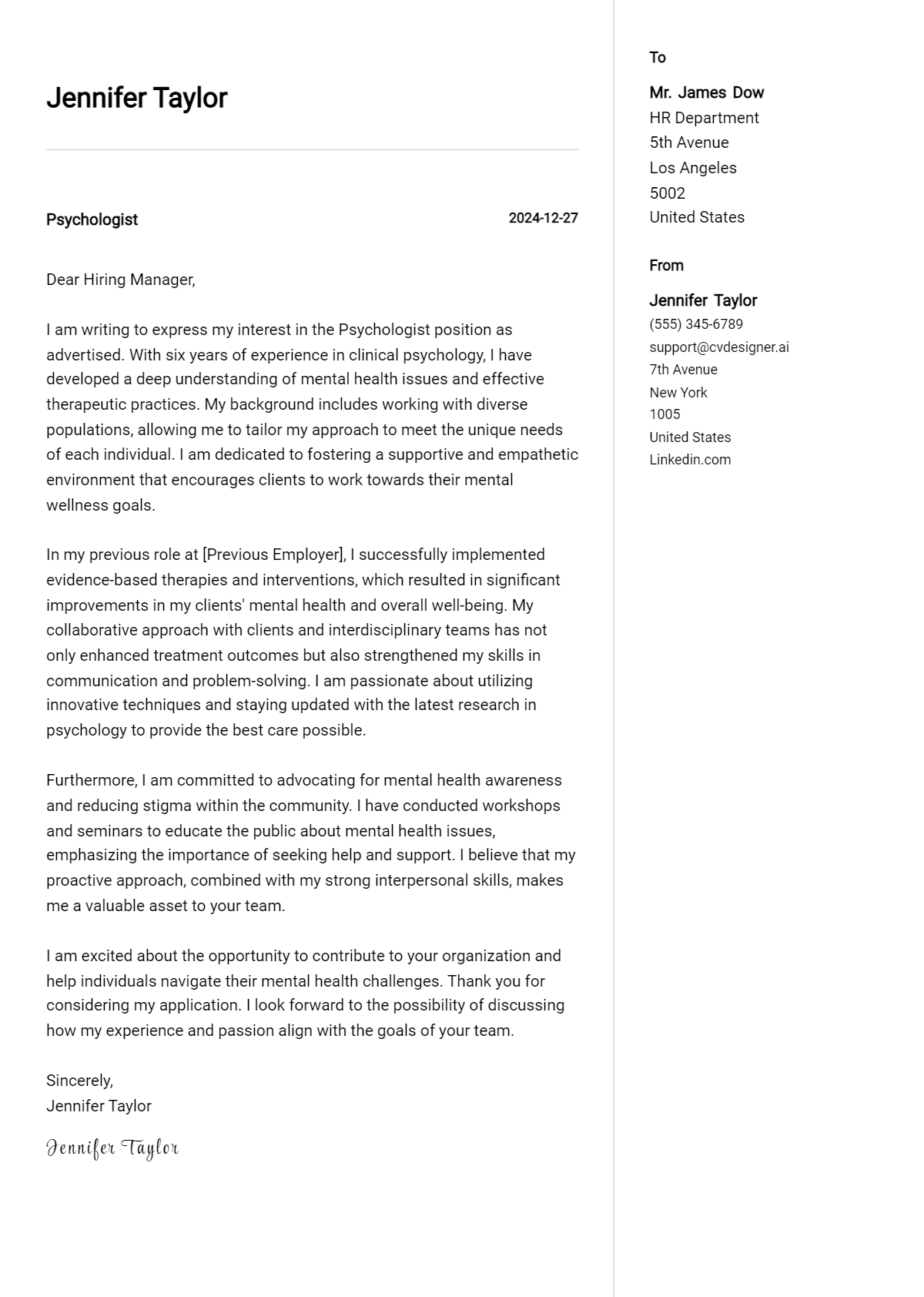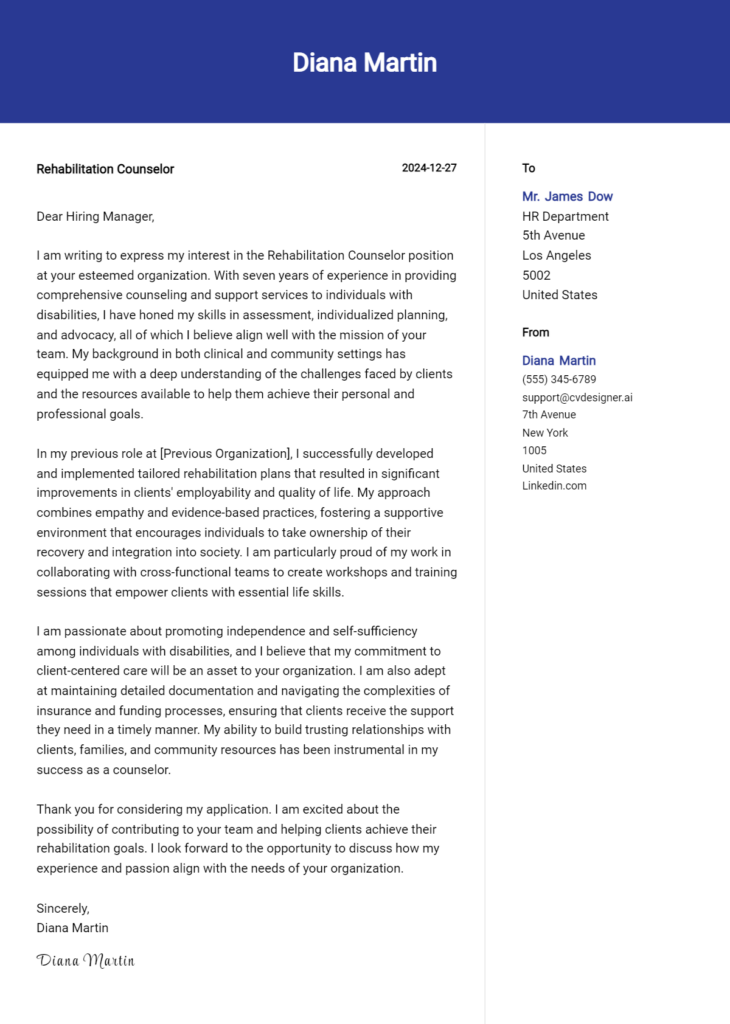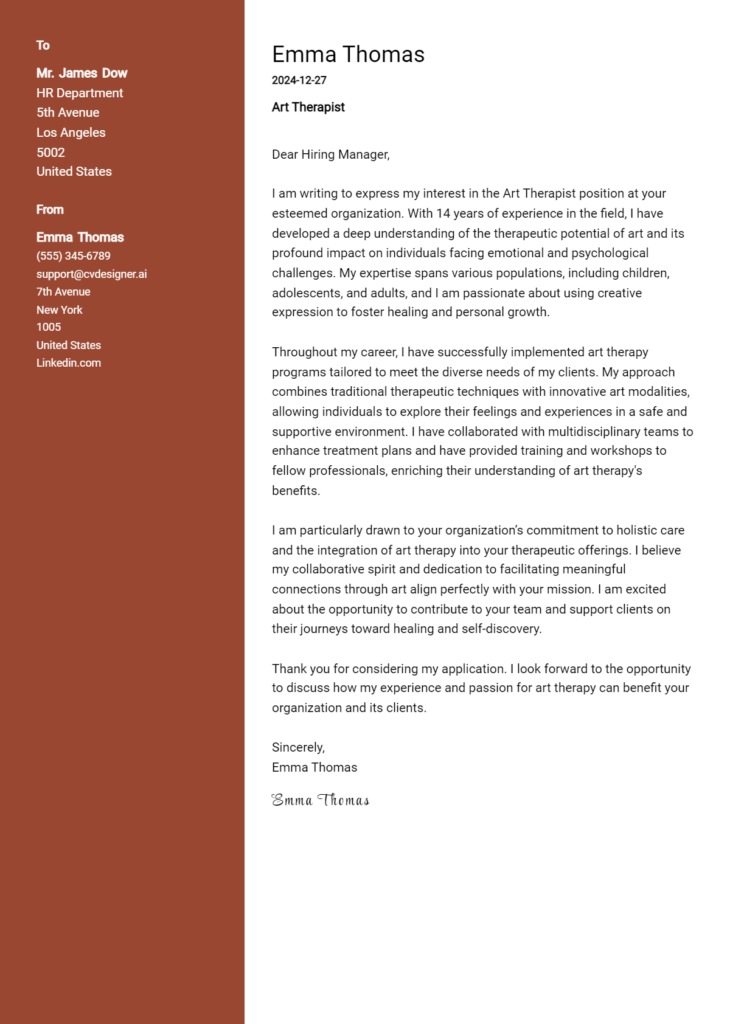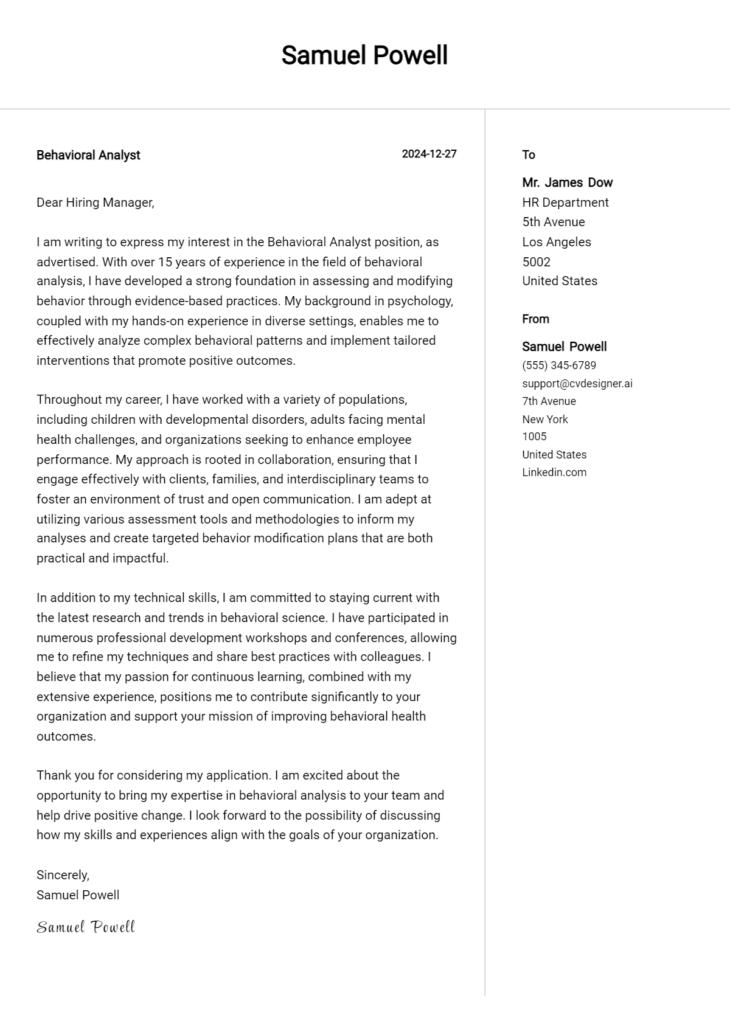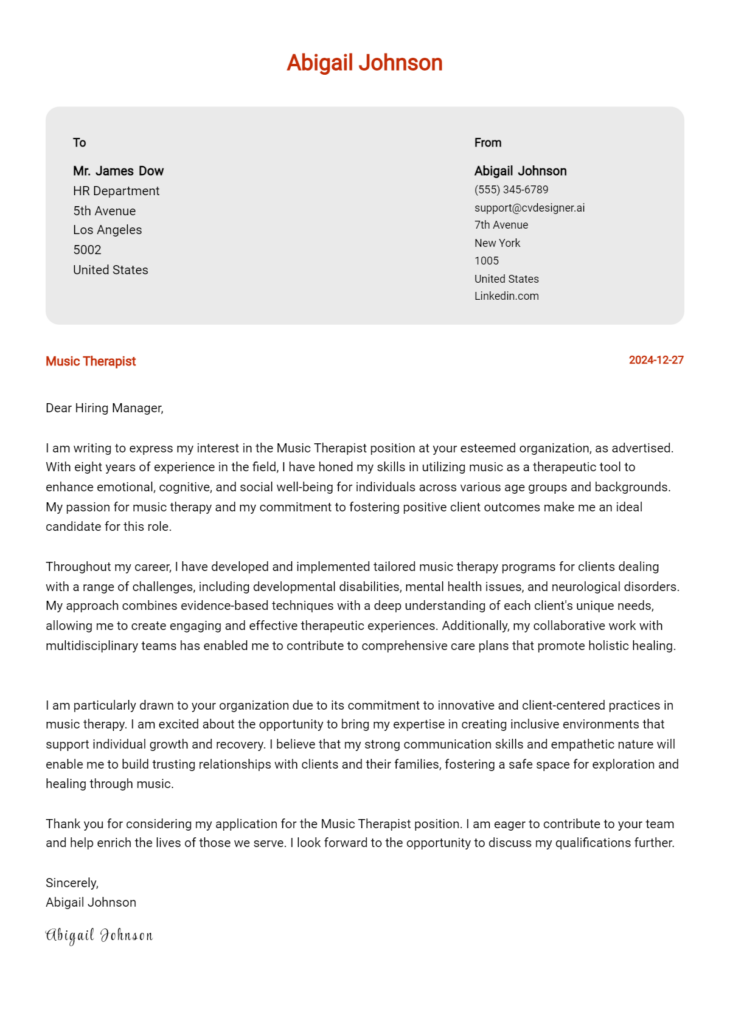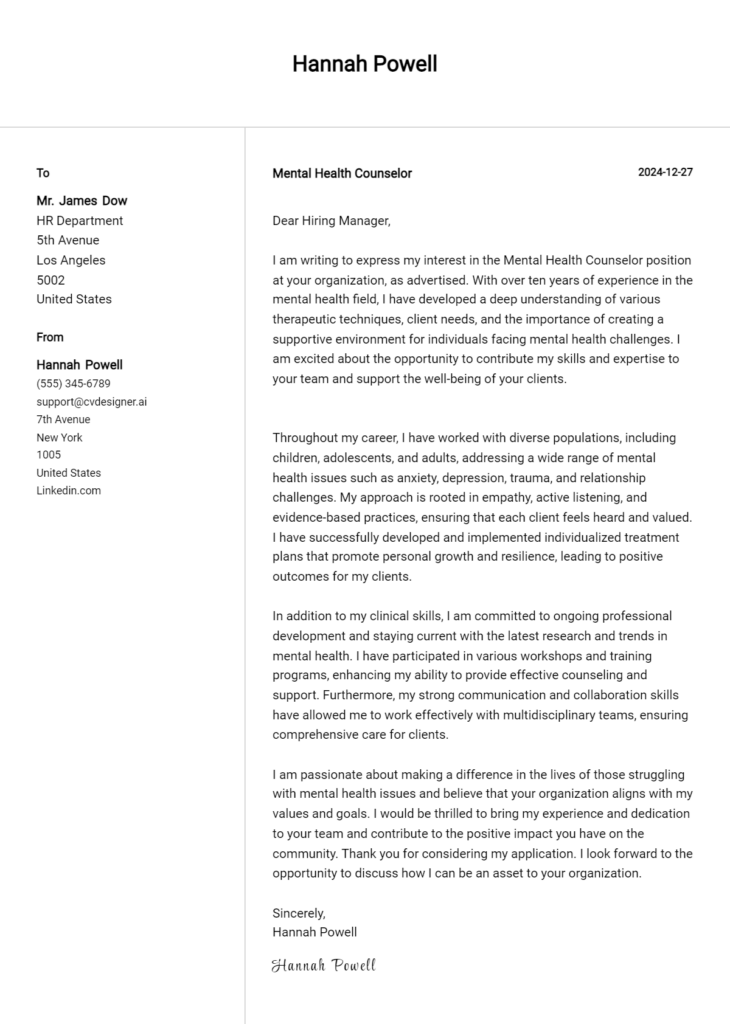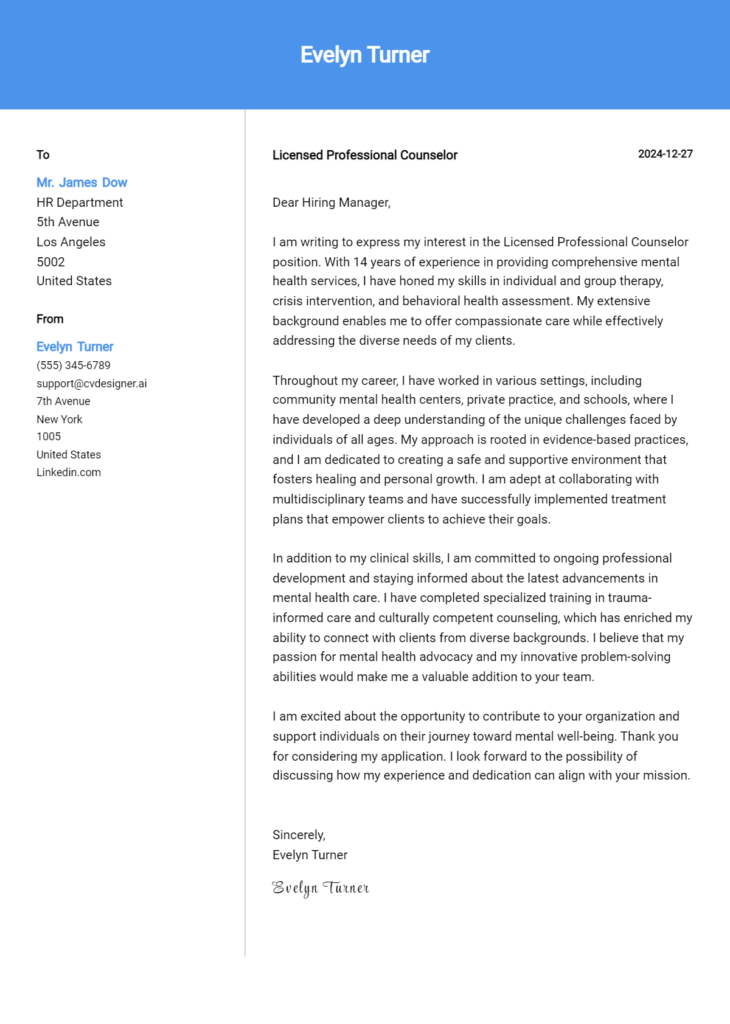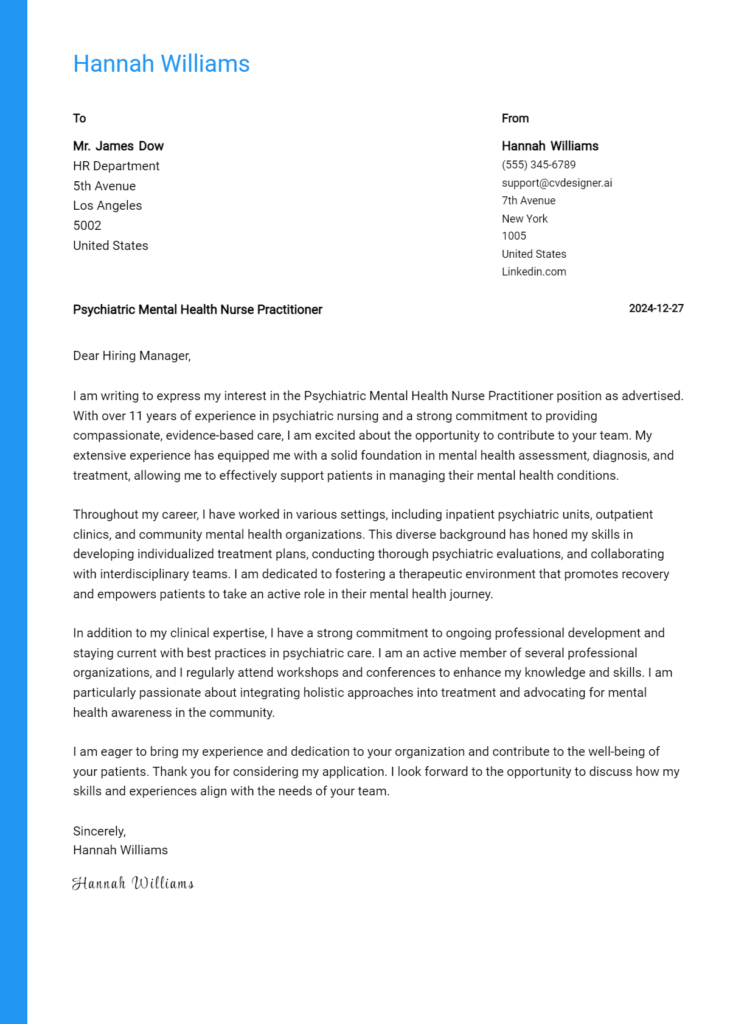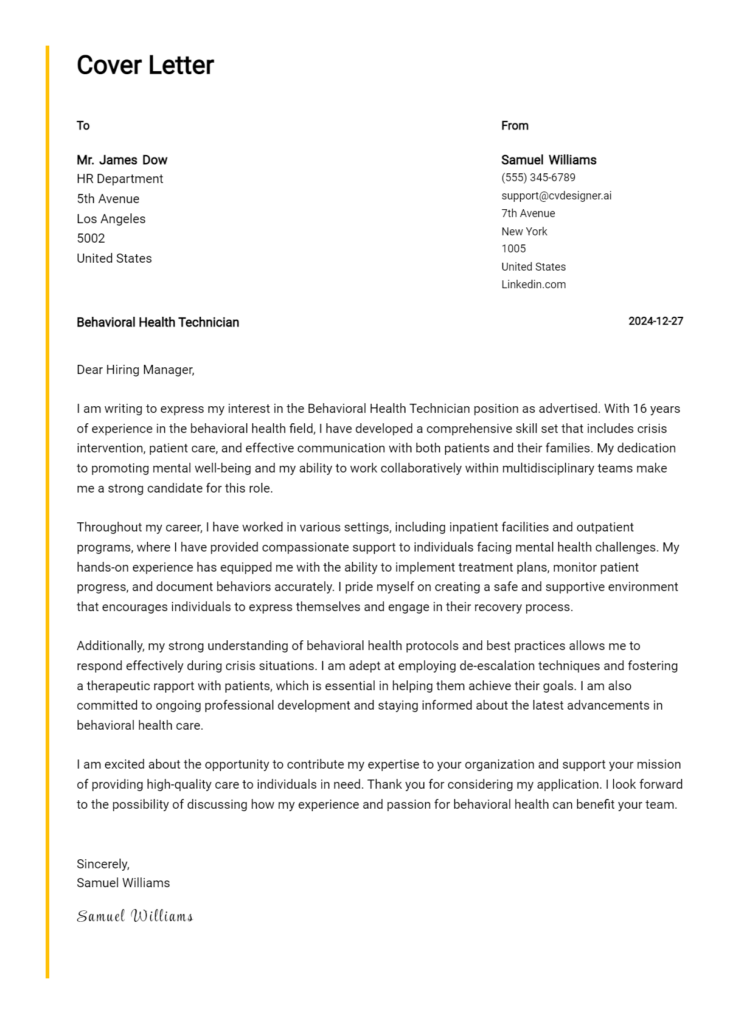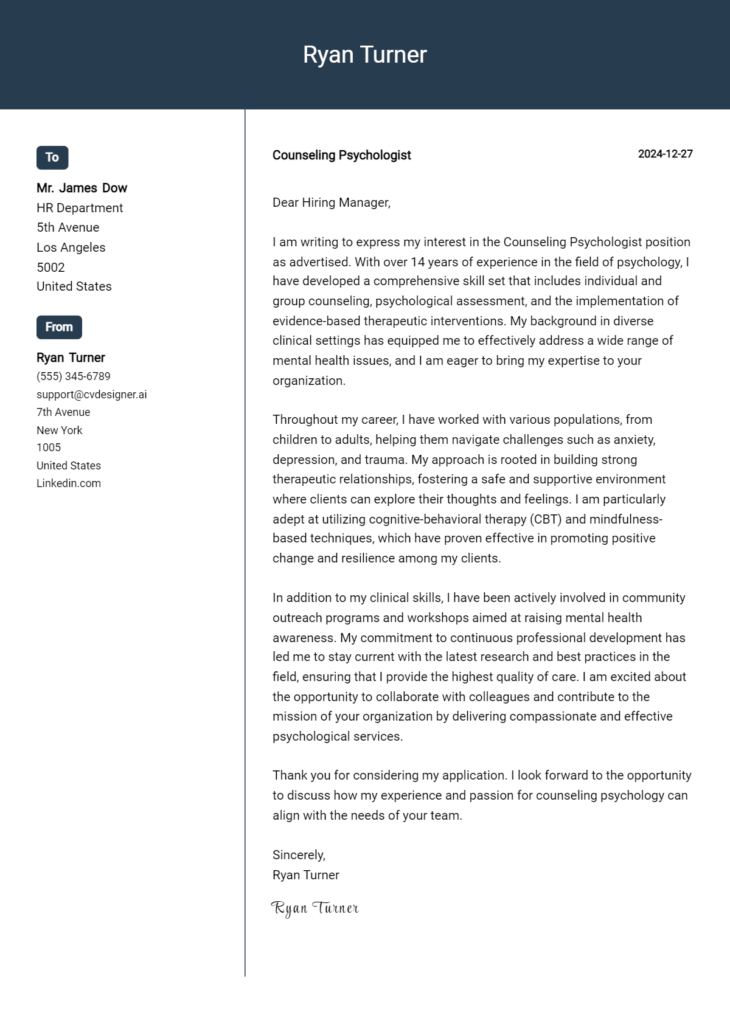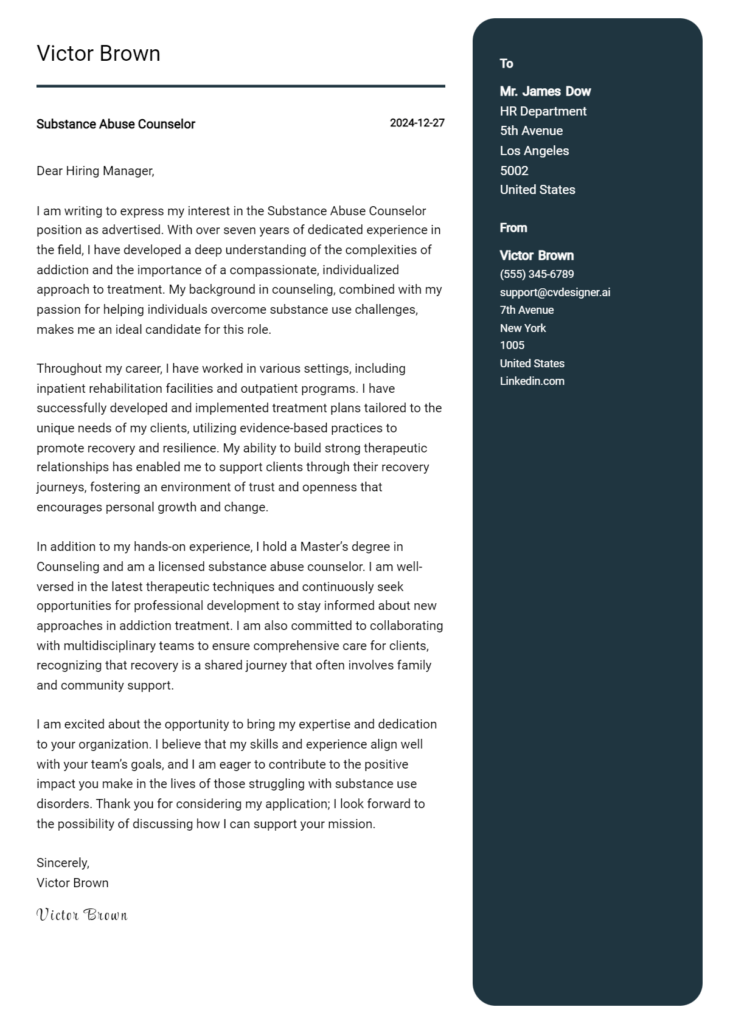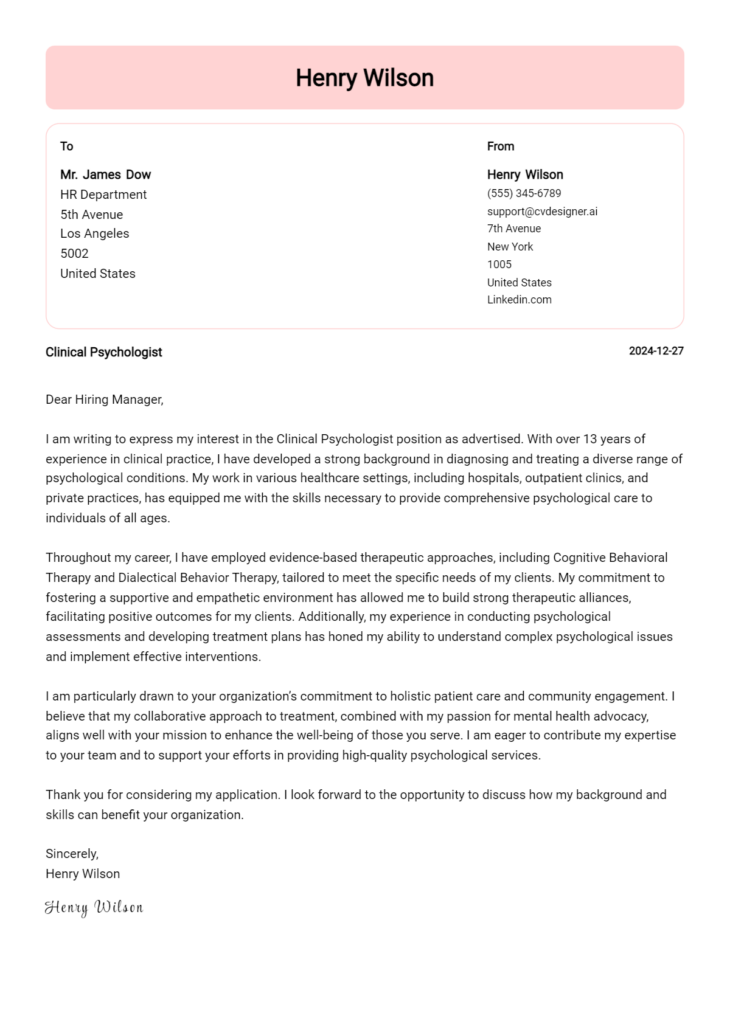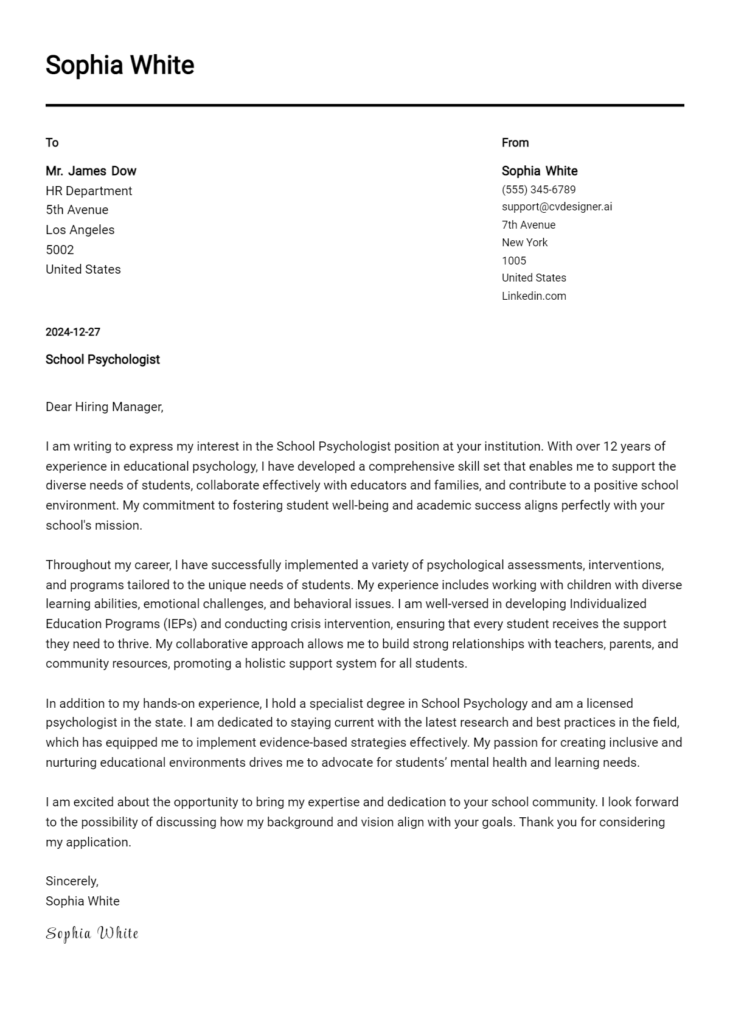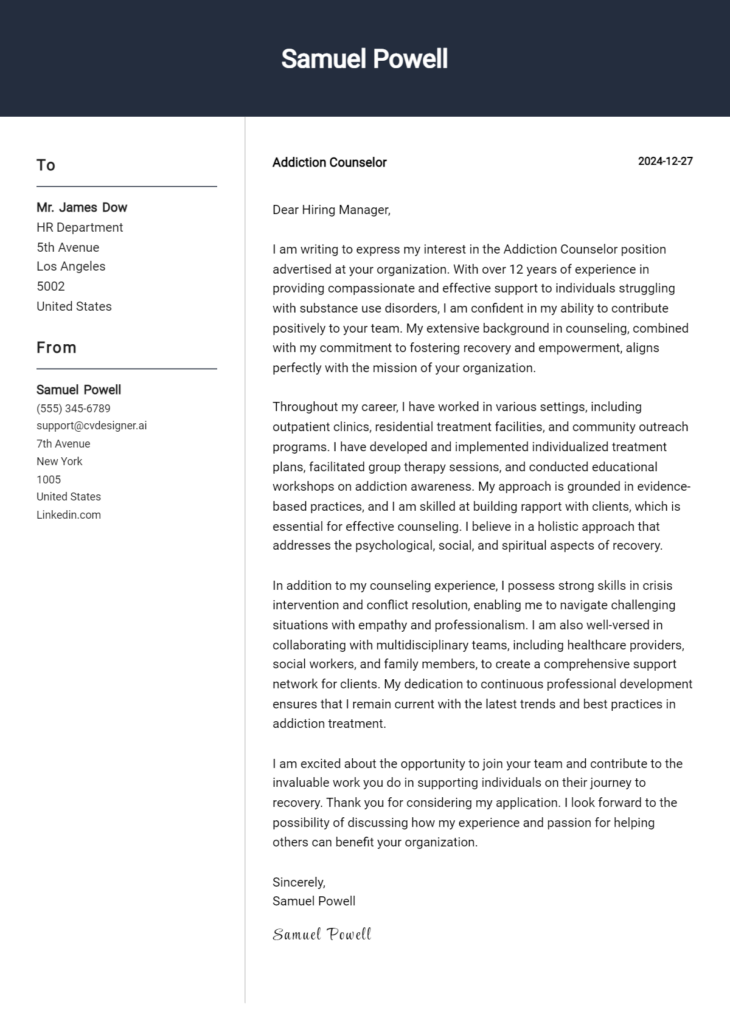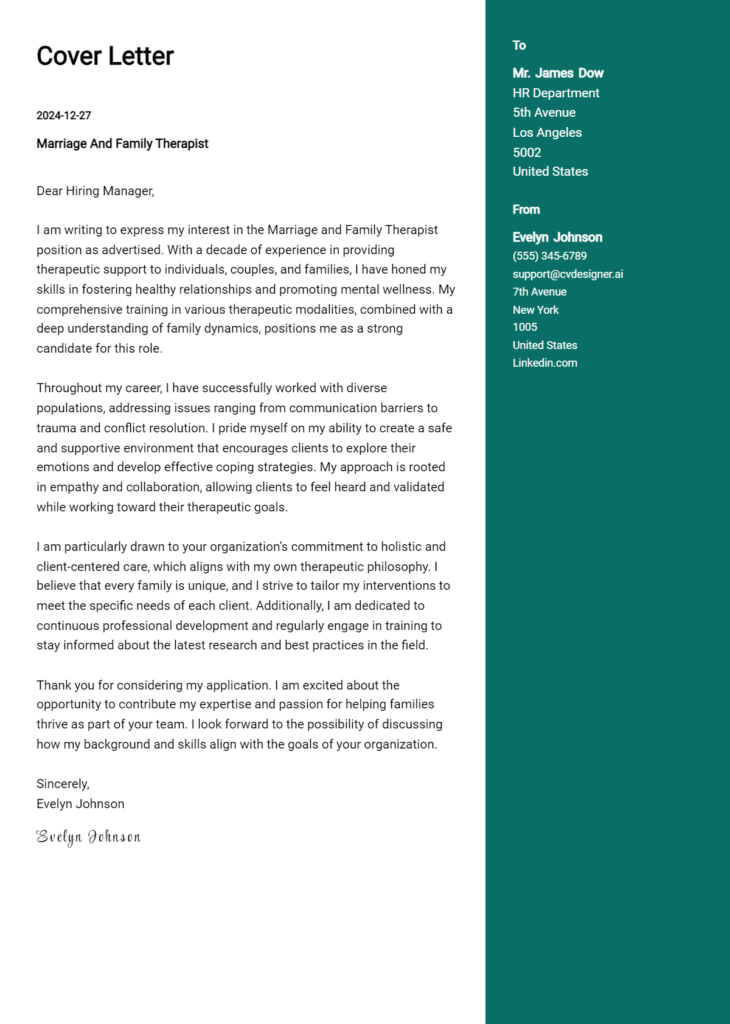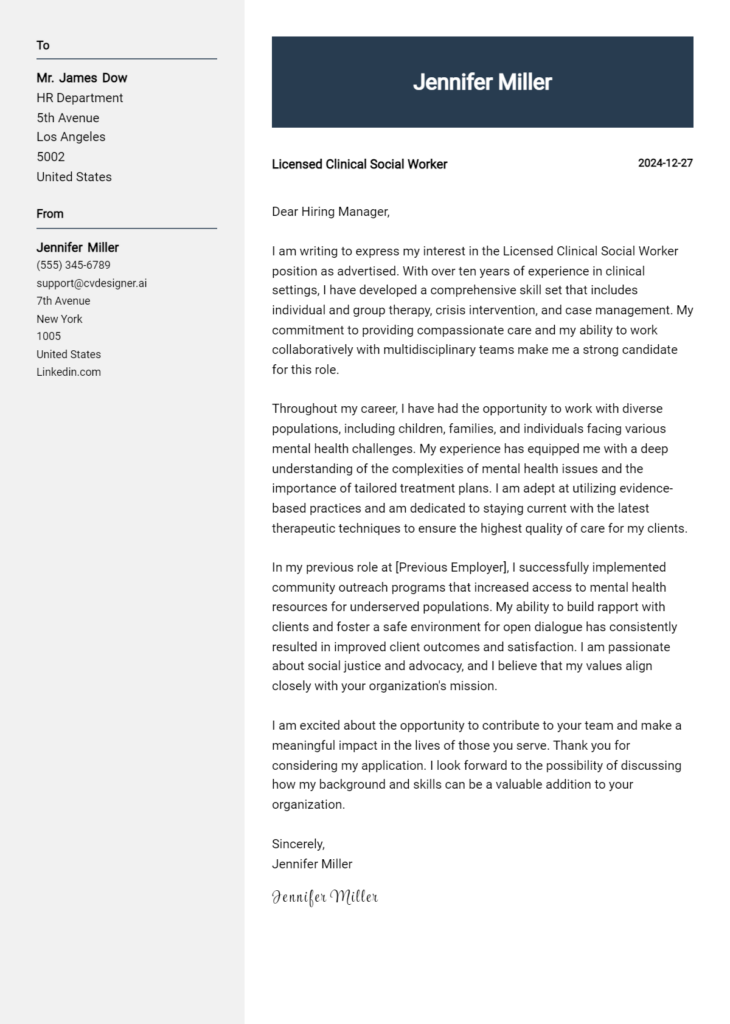Psychologist Cover Letter Examples
Explore additional Psychologist cover letter samples and guides and see what works for your level of experience or role.
How to Format a Psychologist Cover Letter?
Crafting a compelling cover letter is essential for psychologists, as it serves as a reflection of your communication skills and understanding of the profession. The way you format your cover letter is not just about aesthetics; it demonstrates your professionalism and attention to detail, qualities that are paramount in the field of psychology. An effectively structured cover letter can capture the hiring manager's attention, allowing you to present your qualifications in a coherent and impactful manner.
In this guide, we'll explore how to properly structure your psychologist cover letter, providing insights and specific examples tailored for the psychology field.
We'll focus on the essential components of a professional cover letter, including:
- Cover Letter Header
- Cover Letter Greeting
- Cover Letter Introduction
- Cover Letter Body
- Cover Letter Closing
Each section is vital in showcasing your expertise and professionalism. Let’s delve into each part to help you create a standout psychologist cover letter.
The Importance of a Cover Letter Header for a Psychologist
A well-crafted cover letter header is essential for establishing professionalism and clarity when applying for a psychologist position. It serves as the first impression for potential employers and sets the tone for the rest of the application. A strong header should include your contact information, the date, and the recipient's details, ensuring that all necessary information is easily accessible. This clarity not only facilitates communication but also reflects your attention to detail—an important trait for a psychologist.
Here are examples of a strong and weak cover letter header:
Strong Example
Dr. Jane Smith, PsyD 123 Main Street Cityville, State, ZIP jane.smith@email.com (123) 456-7890 October 1, 2023 Hiring Manager Health and Wellness Clinic 456 Elm Street Cityville, State, ZIP
Weak Example
Jane S. Email: jane@email.com 10/01/2023 To whom it may concern:
In the strong example, all relevant information is clearly presented, demonstrating a professional approach. In contrast, the weak example lacks critical details, such as a full name and proper formatting, which could undermine the applicant's credibility.
The Importance of a Cover Letter Greeting for Psychologists
The greeting of a cover letter serves as a critical first impression that sets the tone for the rest of your application. A well-crafted greeting can demonstrate professionalism and personalization, illustrating to the hiring manager that you have taken the time to address them directly. This small yet significant detail reflects your attention to detail and genuine interest in the position. To avoid sounding generic, it's beneficial to research the hiring manager's name, which can often be found on the company's website or LinkedIn. This effort can elevate your application and make it stand out in a competitive field.
Strong Greeting Example
Dear Dr. Smith,
Weak Greeting Example
To Whom It May Concern,
The Importance of a Well-Crafted Cover Letter Introduction for a Psychologist
A well-crafted cover letter introduction is crucial for a psychologist, as it serves as the first impression to the hiring manager. This introduction must effectively capture their attention, convey the candidate’s genuine interest in the role, and succinctly highlight key skills or achievements relevant to the position. A strong introduction not only sets the tone for the rest of the cover letter but also differentiates the candidate from others, making it essential to strike the right balance between professionalism and personality. Below are examples of both strong and weak cover letter introductions to illustrate this point.
Strong Example
Dear [Hiring Manager's Name], I am excited to apply for the Psychologist position at [Company Name], where I can leverage my 10 years of clinical experience and passion for mental health advocacy to make a meaningful impact. My background in cognitive-behavioral therapy and my success in implementing community outreach programs have equipped me with the skills necessary to foster resilience and promote well-being among diverse populations. I am eager to bring my expertise in psychological assessment and treatment to your esteemed team, contributing positively to the lives of those we serve.
Weak Example
To Whom It May Concern, I am writing to apply for the Psychologist job. I have some experience in psychology and I think it could be a good fit for me. I have worked in various settings and have helped people with their issues. I hope to get the job.
Purpose of the Cover Letter Body for a Psychologist
The body of a cover letter for a psychologist serves as a crucial platform for candidates to articulate their qualifications, experiences, and the unique value they can bring to a potential employer. It should effectively highlight specific projects or accomplishments that demonstrate their expertise in the field of psychology, such as successful therapy outcomes, research contributions, or innovative program developments. By detailing these successes, candidates can give employers a clear picture of their capabilities and how they align with the organization’s goals, thereby enhancing their appeal as a candidate.
Strong Example
As a licensed psychologist with over five years of experience in clinical settings, I have developed and implemented a cognitive-behavioral therapy program that has successfully reduced anxiety symptoms in 75% of participants. In my previous role at ABC Counseling Center, I led a team that created a community outreach initiative aimed at increasing mental health awareness, resulting in a 30% increase in service utilization within the first year. My commitment to evidence-based practices, combined with my passion for helping individuals navigate their mental health challenges, makes me an ideal fit for your team at XYZ Mental Health Services.
Weak Example
I have worked as a psychologist for a few years and have done some therapy sessions. I think I am good at my job. I can help people with their problems. I have also attended some workshops and read some psychology books. I would like to work at your organization because I need a job.
Importance of the Cover Letter Closing for a Psychologist
The closing paragraph of a cover letter is crucial for a psychologist as it provides an opportunity to succinctly summarize qualifications, reiterate enthusiasm for the position, and encourage the hiring manager to take the next steps—whether that’s reviewing the resume or scheduling an interview. A strong closing leaves a lasting impression and reinforces the candidate's suitability for the role, while a weak closing may fail to engage the reader, potentially diminishing the impact of the entire letter.
Strong Example
Thank you for considering my application for the Psychologist position at your esteemed institution. With my extensive background in clinical psychology, evidenced by my successful treatment outcomes and research contributions, I am excited about the opportunity to bring my expertise to your team. I am eager to discuss how my skills align with the needs of your practice and would welcome the chance to further elaborate on my qualifications. I look forward to the possibility of scheduling an interview at your convenience and appreciate your time in reviewing my resume.
Weak Example
I hope you liked my letter. I think I could be a good psychologist. If you want, you can look at my resume. Let me know if you want to talk more.
These tips will help candidates craft an effective cover letter for a Psychologist position by emphasizing the importance of showcasing technical skills, problem-solving abilities, knowledge of the Software Development Life Cycle (SDLC), teamwork, and a passion for continuous learning. A well-structured cover letter can make a significant difference in capturing the attention of potential employers and demonstrating your qualifications and enthusiasm for the role.
Tips for Writing a Cover Letter for Psychologist Positions
Highlight Your Technical Skills: Clearly outline your technical expertise relevant to psychology, such as familiarity with psychological assessment tools, data analysis software, or electronic health records systems. Be specific about the tools you have used and how they have contributed to your work, as this will demonstrate your ability to leverage technology in a clinical setting.
Showcase Problem-Solving Abilities: Use specific examples from your previous experiences to illustrate how you've successfully navigated challenges in clinical settings. Discuss situations where you developed treatment plans or made critical decisions that positively impacted your clients. This will highlight your analytical skills and readiness to tackle complex psychological issues.
Demonstrate Knowledge of the SDLC: While not always directly related to psychology, understanding the Software Development Life Cycle can be beneficial, especially if your role involves working with digital tools or platforms designed for mental health services. Mention any experience you have in collaborating with IT teams or utilizing software that follows SDLC principles, showing your adaptability in a tech-driven environment.
Emphasize Teamwork: Psychologists often work as part of a multidisciplinary team. Highlight your ability to collaborate with other professionals, such as social workers, psychiatrists, and nurses. Including examples of successful team projects or initiatives can illustrate your capability to contribute positively to a collaborative environment.
Express a Passion for Continuous Learning: The field of psychology is constantly evolving. Showcase your commitment to professional development by mentioning any relevant courses, certifications, or workshops you have attended. This not only reflects your dedication to staying updated with the latest research and practices but also signals your eagerness to grow within the field.
For further assistance, consider using our cover letter templates or try our cover letter builder to create a personalized and compelling cover letter that will enhance your application.
Common Mistakes to Avoid in a Psychologist Cover Letter
Crafting an effective cover letter is essential for securing a position as a psychologist, as it is often your first opportunity to make a lasting impression on potential employers. Avoiding common mistakes can significantly enhance your chances of success. Here are some pitfalls to steer clear of:
Generic Content: Failing to tailor your cover letter to the specific job can make it seem impersonal. Always personalize your letter by addressing the hiring manager by name and referencing the specific role.
Lengthy Paragraphs: Long, dense paragraphs can be overwhelming. Use concise paragraphs and bullet points to improve readability.
Lack of Specific Examples: Providing vague statements about your skills without backing them up with examples can weaken your case. Include specific achievements or experiences that highlight your qualifications.
Ignoring Professional Language: Using casual language or slang can undermine your professionalism. Maintain a formal tone throughout your letter.
Neglecting Formatting: Poor formatting can distract from your content. Ensure your cover letter follows a clear cover letter format that enhances readability.
Spelling and Grammar Errors: Typos and grammatical mistakes can create a negative impression. Always proofread your letter or use tools to check for errors.
Missing Call to Action: Failing to express enthusiasm or a desire for an interview can leave your letter flat. End with a strong call to action, inviting the reader to discuss your application further.
To see examples of effective cover letters, check out these cover letter examples. By avoiding these common mistakes, you can create a compelling cover letter that effectively showcases your qualifications as a psychologist.
Cover Letter FAQs for Psychologist
What should I include in my cover letter as a psychologist?
Your cover letter should highlight your relevant qualifications, experience, and skills. Start with an engaging introduction that briefly explains your interest in the position and the organization. Include your educational background, such as your degree in psychology and any specialized training. Discuss your clinical experiences, focusing on the settings you've worked in and the populations you've served. Mention any relevant certifications or licenses. It’s also important to convey your therapeutic approach and any specific techniques you're proficient in. Finally, express your enthusiasm for the role and how your values align with the organization's mission.
How can I tailor my cover letter to a specific job?
To tailor your cover letter effectively, research the organization and the specific role you’re applying for. Analyze the job description to identify key responsibilities and required skills. Incorporate relevant keywords and phrases from the listing into your letter. Highlight experiences and achievements that directly relate to the job’s requirements, emphasizing how your background makes you a suitable candidate. For example, if the position involves working with children, discuss your experiences in child psychology. Additionally, demonstrate your understanding of the organization’s mission or values and explain how you can contribute to their goals.
Should I mention my research experience in my cover letter?
Yes, mentioning your research experience can significantly strengthen your cover letter, especially if it relates to the job you're applying for. Research experience demonstrates your analytical skills, critical thinking, and ability to contribute to evidence-based practices. Discuss any research projects you’ve participated in, focusing on your role, methodologies used, and outcomes achieved. If your research aligns with the organization's focus or the specific role, highlight this connection. For example, if you studied the effectiveness of a particular therapeutic approach, mention how this knowledge could benefit your potential clients in the new position.
How long should my cover letter be?
Your cover letter should ideally be one page long, consisting of three to four paragraphs. Aim for concise, clear language to communicate your qualifications and enthusiasm without overwhelming the reader. An effective cover letter typically ranges from 250 to 400 words. Start with a strong introduction, followed by a paragraph detailing your experience and skills, and another discussing your fit for the role and organization. Conclude with a call to action, expressing your eagerness for an interview. Keeping your letter brief and focused ensures that hiring managers can quickly grasp your value as a candidate.
Build your Cover Letter in minutes
Use an AI-powered cover letter builder and have your letter done in 5 minutes. Just select your template and our software will guide you through the process.

